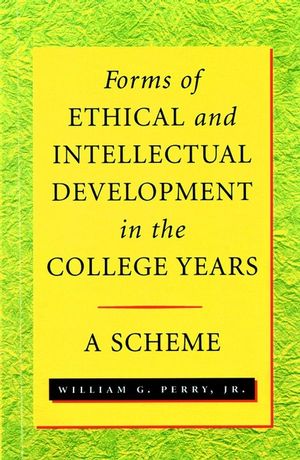« Perry 1970 » : différence entre les versions
Aucun résumé des modifications |
|||
| Ligne 6 : | Ligne 6 : | ||
<!-- Mettre le titre supra pour qu'il apparaisse en grand au sommet de la page --> | <!-- Mettre le titre supra pour qu'il apparaisse en grand au sommet de la page --> | ||
[[Fichier: | [[Fichier:Perry_1970.jpg]] | ||
<!-- Si une image est disponible, la charger dans les fichiers (en respectant les conventions de nommage) et remplacer CouvertureParDefaut.jpg supra par le nom du fichier image --> | <!-- Si une image est disponible, la charger dans les fichiers (en respectant les conventions de nommage) et remplacer CouvertureParDefaut.jpg supra par le nom du fichier image --> | ||
Dernière version du 12 juin 2016 à 12:39
Forms of Intellectual and Ethical Development in the College Years: A Scheme
1. Références
- Référence complète APA : Perry, William G., Jr. (1970), Forms of Intellectual and Ethical Development in the College Years: A Scheme (New York: Holt, Rinehart, and Winston).
- Auteur(s) : William Perry
2. Copies
- Copie électronique en ligne :
- Copie électronique locale :
- Copie physique CP :
- Copie physique en bibliothèque :
3. Mots-clés
4. Quart de couverture
Since its original publication in 1970, this landmark book by William Perry has remained the cornerstone of much of the student development research that followed. Using research conducted with Harvard undergraduates over a fifteen-year period, Perry derived an Anduring framework for characterizing student development--a scheme so accurate that it still informs and advances investigations into student development across gAnders and cultures.
Drawing from firsthand accounts, Perry traces a path from students' adolescence into adulthood. His nine-stage model describes the steps that move students from a simplistic, categorical view of knowledge to a more complex, contextual view of the world and of themselves. Throughout this journey of cognitive development, Perry reveals that the most significant changes occur in forms in which people perceive their world rather than in the particulars of their attitudes and concerns. He shows ultimately that the nature of intellectual development is such that we should pay as much attention to the processes we use as to the content.
In a new introduction to this classic work, Lee Knefelkamp--a close colleague of Perry's and a leading expert on college student development--evaluates the book's place in the literature of higher education. Knefelkamp explains how the Perry scheme has shaped current thinking about student development and discusses the most significant research that has since evolved from Perry's groundbreaking effort.
Forms of Ethical and Intellectual Development in the College Years is a work that every current and future student services professional must have in their library.
5. Table des matières (facultatif)
6. Résumé personnel (facultatif)
Le livre fondateur de Perry qui a ouvert la voie aux recherches sur les croyances épistémiques des étudiants. Propose une évolution des conceptions en 9 stades / 4 grandes dimensions (cf. http://www.cse.buffalo.edu/~rapaport/perry.positions.html) Cette approche développementale a été contestée par la suite par d'autres chercheurs qui préfèrent voir dans les croyances épistémiques un ensemble de croyances plus ou moins disparates et sans évolution claire en "stades", mais le courant développemental a également poursuivi son chemin.
7. Voir aussi
